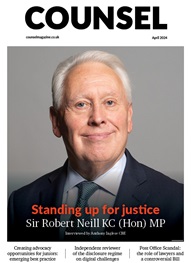*/
The Bar Council has welcomed the news that the Legal Services Commission (“LSC”) is to become an executive agency of the Ministry of Justice (“MoJ”).
The change in status will see the MoJ taking tighter control of the £2.1 billion legal aid budget. A Bill will be introduced to implement the changes as soon as Parliamentary time allows. Carolyn Regan, who has served as the LSC’s Chief Executive for three and a half years, resigned following the announcement, which implements a recommendation of Sir Ian Magee’s review into the delivery of legal aid. Carolyn Downs, an MoJ Civil Servant, has been appointed interim Chief Executive.
Carol Storer, Director of the Legal Aid Practitioners Group, said “independence” was an important concern, but added: “There will have to be legislation to effect this, which could take months or a year, and the issue of safeguarding independence will be addressed during that process.
“There are precedents across government, for example, housing benefit administration.” LSC Chair Sir Bill Callaghan said Regan had provided “inspirational leadership”. “Whatever the changes to the organisation, the underlying challenge remains the same – the effective management of legal aid within a fixed budget, while ensuring that the necessary help is available to those who need it most,” he said.
Sir Ian Magee said the LSC had been “given wide but largely undefined powers” when it was first set up, and “much has changed” over those ten years.
His “Review of Legal Aid Delivery and Governance”, commissioned by the MoJ and published in March, was the third major report to criticise the LSC in the last 12 months. In February, the Public Accounts Committee reported that a lack of clarity about the roles of the LSC and the MoJ was creating “uncertainty” and “duplication”. It found weak financial management and internal controls, and concluded the LSC lacked “strategic direction”. In October 2009, the National Audit Office qualified the LSC’s accounts due to an estimated £25 million overpayment to solicitors.
Carol Storer, Director of the Legal Aid Practitioners Group, said “independence” was an important concern, but added: “There will have to be legislation to effect this, which could take months or a year, and the issue of safeguarding independence will be addressed during that process.
“There are precedents across government, for example, housing benefit administration.” LSC Chair Sir Bill Callaghan said Regan had provided “inspirational leadership”. “Whatever the changes to the organisation, the underlying challenge remains the same – the effective management of legal aid within a fixed budget, while ensuring that the necessary help is available to those who need it most,” he said.
Sir Ian Magee said the LSC had been “given wide but largely undefined powers” when it was first set up, and “much has changed” over those ten years.
His “Review of Legal Aid Delivery and Governance”, commissioned by the MoJ and published in March, was the third major report to criticise the LSC in the last 12 months. In February, the Public Accounts Committee reported that a lack of clarity about the roles of the LSC and the MoJ was creating “uncertainty” and “duplication”. It found weak financial management and internal controls, and concluded the LSC lacked “strategic direction”. In October 2009, the National Audit Office qualified the LSC’s accounts due to an estimated £25 million overpayment to solicitors.
The Bar Council has welcomed the news that the Legal Services Commission (“LSC”) is to become an executive agency of the Ministry of Justice (“MoJ”).
The change in status will see the MoJ taking tighter control of the £2.1 billion legal aid budget. A Bill will be introduced to implement the changes as soon as Parliamentary time allows. Carolyn Regan, who has served as the LSC’s Chief Executive for three and a half years, resigned following the announcement, which implements a recommendation of Sir Ian Magee’s review into the delivery of legal aid. Carolyn Downs, an MoJ Civil Servant, has been appointed interim Chief Executive.


Sam Townend KC explains the Bar Council’s efforts towards ensuring a bright future for the profession
Giovanni D’Avola explores the issue of over-citation of unreported cases and the ‘added value’ elements of a law report
Louise Crush explores the key points and opportunities for tax efficiency
Westgate Wealth Management Ltd is a Partner Practice of FTSE 100 company St. James’s Place – one of the top UK Wealth Management firms. We offer a holistic service of distinct quality, integrity, and excellence with the aim to build a professional and valuable relationship with our clients, helping to provide them with security now, prosperity in the future and the highest standard of service in all of our dealings.
Is now the time to review your financial position, having reached a career milestone? asks Louise Crush
If you were to host a dinner party with 10 guests, and you asked them to explain what financial planning is and how it differs to financial advice, you’d receive 10 different answers. The variety of answers highlights the ongoing need to clarify and promote the value of financial planning.
Most of us like to think we would risk our career in order to meet our ethical obligations, so why have so many lawyers failed to hold the line? asks Flora Page
If your current practice environment is bringing you down, seek a new one. However daunting the change, it will be worth it, says Anon Barrister
Creating advocacy opportunities for juniors is now the expectation but not always easy to put into effect. Tom Mitcheson KC distils developing best practice from the Patents Court initiative already bearing fruit
Sam Townend KC explains the Bar Council’s efforts towards ensuring a bright future for the profession
The long-running fee-paid judicial pensions saga continues. The current cut-off date for giving notice of election to join FPJPS is 31 March 2024, and that date now gives rise to a serious problem, warns HH John Platt